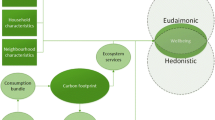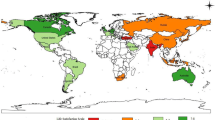Abstract
This study investigates the link between personal well-being and per capita greenhouse gas emissions by considering a panel data methodological approach. The empirical findings illustrate that there is a significant effect of those emissions on personal well-being through the aggregate country sample. A robust finding is that similar results hold across regional samples, with the strongest effect being displayed in the case of the European regional component. The empirical findings are expected to carry important implications for consumers, corporations, and economic policy makers who all must take explicitly into consideration the impact of their economic decisions on the sustainability of economic growth plans.
Similar content being viewed by others
References
Alesina, A., Di Tella, R., & MacCulloch, R. (2004). Inequality and happiness: Are Europeans and Americans different. Journal of Public Economics, 88, 2009–2042.
Alexander, S., & Ussher, S. (2012). The voluntary simplicity movement: A multinational survey analysis in theoretical context. Journal of Consumer Culture, 12, 66–86.
Andersson, D., Nässén, J., & Larsson, J. (2014). Greenhouse gas emissions and subjective well-being: An analysis of Swedish households. Ecological Economics, 102, 75–82.
Argyle, M. (1999). Causes and correlates of happiness. In D. Kahneman, E. Diener, & N. Schwarz (Eds.), Well-being: The foundations of hedonic psychology. New York: Russell Sage Foundation.
Brereton, F., Clinch, J. P., & Ferreira, S. (2008). Happiness, geography, and the environment. Ecological Economics, 65, 386–396.
Brown, K. W., & Kasser, T. (2005). Are psychological and ecological wellbeing compatible? The role of values, mindfulness, and lifestyle. Social Indicators Research, 74, 349–368.
Di Tella, R., & MacCulloch, R. J. (2008). Gross national happiness as an answer to the Easterlin Paradox? Journal of Development Economics, 86, 22–42.
Di Tella, R., MacCulloch, R. J., & Oswald, A. (2003). The macroeconomics of happiness. The Review of Economics and Statistics, 85, 809–827.
Dolan, P., & White, M. P. (2007). How can measures of subjective well-being be used to inform public policy? Perspectives on Psychological Science, 2, 71–85.
Easterlin, R. A. (2003). Explaining happiness. Proceedings of the National Academy of Sciences, 100, 11176–11183.
Frey, B. S., & Stutzer, A. (2002). Happiness and economics. Princeton: University Press.
Frijters, P., & Van Praag, B. M. S. (1998). The effects of climate on welfare and wellbeing in Russia. Climate Change, 39, 61–81.
Gilbert, D. (2006). Stumbling on happiness. New York: Knopf.
Graham, C., & Pettinato, S. (2001). Happiness, markets and democracy: Latin America in comparative perspective. Journal of Happiness Studies, 2, 237–268.
Hansson, E., Mattisson, K., Björk, J., Östergren, P. O., & Jakobsson, K. (2011). Relationship between commuting and health outcomes in a cross-sectional population survey in Southern Sweden. BMC Public Health, 11, 834–839.
Hurst, M., Dittmar, H., Bond, R., & Kasser, T. (2013). The relationship between materialistic values and environmental attitudes and behaviors: A meta-analysis. Journal of Environmental Psychology, 30, 245–248.
Killingsworth, M. A., & Gilbert, D. T. (2010). A wandering mind is an unhappy mind. Science, 330, 932–941.
Layard, R. (2005). Happiness: Lessons from a new science. London: Allen Lane.
Lenzen, M., & Cummins, R. A. (2013). Happiness versus the environment-A case study of Australian lifestyles. Challenges, 4, 56–74.
MacKerron, G., & Mourato, S. (2009). Life satisfaction and air quality in London. Ecological Economics, 68, 1441–1453.
Markowitz, E. M., & Bowerman, T. (2012). How much is enough? Examining the public’s beliefs about consumption. Analyses of Social Issues and Public Policy, 12, 167–189.
Martin, R., Muûls, M., de Preux, L. B., & Wagner, U. J. (2014). On the empirical content of carbon leakage criteria in the EU Emissions Trading Scheme. Ecological Economics, 105, 78–88.
Mazur, A. (2011). Does increasing energy or electricity consumption improve quality of life in industrial nations? Energy Policy, 39, 2568–2572.
Miller, D. (1998). A theory of shopping. New York: Cornell University Press.
Ming-Chang, T. (2009). Market openness in transition economies and subjective well-being. Journal of Happiness Studies, 10, 523–539.
Pedroni, P. (2004). Panel cointegration: Asymptotic and finite sample properties of pooled time series tests with an application to the PPP hypothesis. Econometric Theory, 20, 597–625.
Pesaran, M. (2004). General diagnostic tests for cross section dependence in panels. Cambridge Working Papers in Economics, No. 435 and CESifo Working Paper, No. 1229.
Pesaran, M. (2007). A simple panel unit root test in the presence of cross-section dependence. Journal of Applied Econometrics, 22, 265–312.
Rehdanz, K., & Maddison, D. (2005). Climate and happiness. Ecological Economics, 52, 111–125.
Rehdanz, K., & Maddison, D. (2008). Local environmental quality and life-satisfaction in Germany. Ecological Economics, 64, 787–797.
Richins, M. L., & Dawson, S. (1992). A consumer values orientation for materialism and its measurement: Scale development and validation. Journal of Consumer Research, 9, 303–316.
Ryan, L., & Dziurawiec, S. (2001). Materialism and its relationship to life satisfaction. Social Indicators Research, 55, 85–97.
Sekulova, F., & Van den Bergh, J. C. (2013). Climate change, income and happiness: An empirical study for Barcelona. Global Environmental Change, 23, 1467–1475.
SIKA. (2007). Statistik (p. 19). Sweden: RES 2005-2006, The national Swedish travel survey.
Smith, V., Leybourne, S., & Kim, T. H. (2004). More powerful panel unit root tests with an application to the mean reversion in real exchange rates. Journal of Applied Econometrics, 19, 147–170.
Smyth, R., Mishra, V., & Qian, X. (2008). The environment and well-being in urban China. Ecological Economics, 68, 547–555.
Stutzer, A., & Frey, B. S. (2008). Stress that does not pay: The commuting paradox. Scandinavian Journal of Economics, 10, 339–366.
Tjernström, E., & Tietenberg, T. (2008). Do differences in attitudes explain differences in national climate change policies? Ecological Economics, 65, 315–324.
Van Praag, B. M. S., & Baarsma, B. E. (2005). Using happiness surveys to value intangibles: The case of airport noise. Economic Journal, 115, 224–246.
Weinhold, D. (2009). How big a problem is noise pollution? A brief happiness analysis by a perturbable economist. Working Paper, London School of Economics.
Welsch, H. (2002). Preferences over prosperity and pollution: Environmental valuation based on happiness studies. Kyklos, 55, 473–494.
Welsch, H. (2006). Environment and happiness: Valuation of air pollution using life satisfaction data. Ecological Economics, 58, 801–813.
Williams, G. C., Cox, E. M., Hedberg, V. A., & Deci, E. L. (2000). Extrinsic life goals and health-risk behaviors in adolescents. Journal of Applied Social Psychology, 30, 756–771.
Wilson, J., Tyedmers, P., & Spinney, J. E. (2013). An exploration of the relationship between socioeconomic and well-being variables and household greenhouse gas emissions. Journal of Industrial Ecology, 17, 880–891.
Wolfers, J. (2003). Is business cycle volatility costly. Evidence from surveys of subjective well-being. International Finance, 6, 1–26.
Zidansek, A. (2007). Sustainable development and happiness in nations. Energy, 32, 891–897.
Acknowledgments
The author needs to express his deep gratitude to both referees of this journal for their valuable comments and suggestions that enhanced the merit of this paper.
Author information
Authors and Affiliations
Corresponding author
Appendix
Appendix
Sample countries.
Europe: Austria, Belgium, Bulgaria, Croatia, Denmark, Finland, France, Germany, Greece, Ireland, Italy, Luxembourg, Netherlands, Norway, Poland, Portugal, Romania, Slovakia, Slovenia, Spain, Sweden, Switzerland, U.K.
America: Argentina, Bolivia, Brazil, Chile, Costa Rica, El Salvador, Equator, Honduras, Mexico, Nicaragua, Panama, Paraguay, Peru, Uruguay, U.S., Venezuela.
Asia: Brunei, Hong-Kong, India, Indonesia, Israel, Japan, Jordan, Kuwait, Malaysia, Nepal, Oman, Pakistan, Qatar, Singapore, South Arabia, South Korea, Taiwan.
Pacific: Australia, New Zealand.
Rights and permissions
About this article
Cite this article
Apergis, N. The Impact of Greenhouse Gas Emissions on Personal Well-Being: Evidence from a Panel of 58 Countries and Aggregate and Regional Country Samples. J Happiness Stud 19, 69–80 (2018). https://doi.org/10.1007/s10902-016-9809-y
Published:
Issue Date:
DOI: https://doi.org/10.1007/s10902-016-9809-y




